30+ Sample Paternity Leave [ Policy, Paid, Statutory ]
-
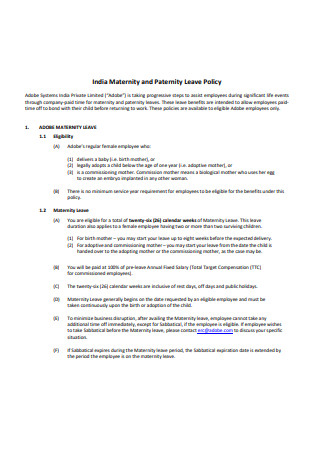
Paternity Leave Policy
download now -

Paternity Leave Format
download now -

Sample Paternity Leave
download now -
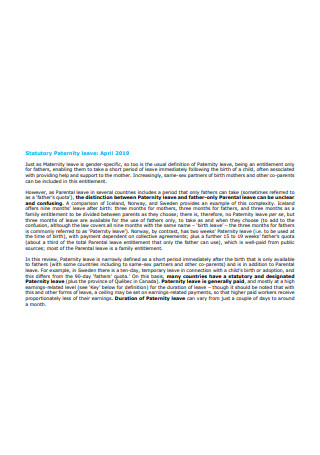
Sample Paternity Leave Format
download now -
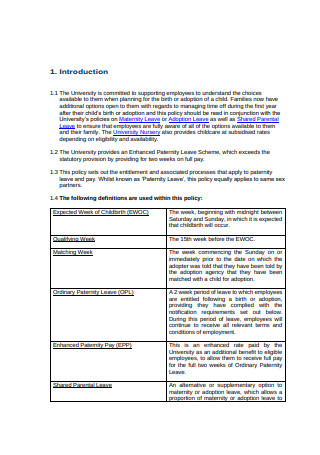
Paternity Leave Policy Example
download now -
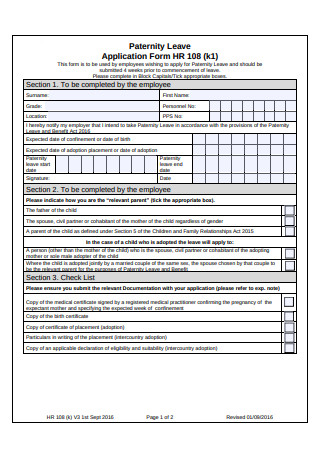
Paternity Leave Application Form
download now -
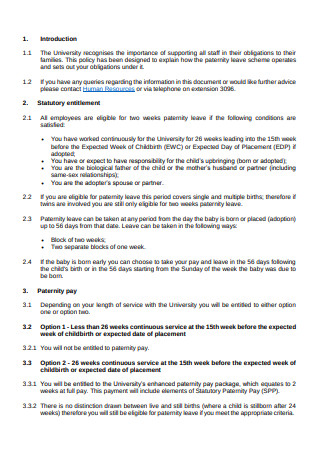
Sample Paternity Leave Policy
download now -
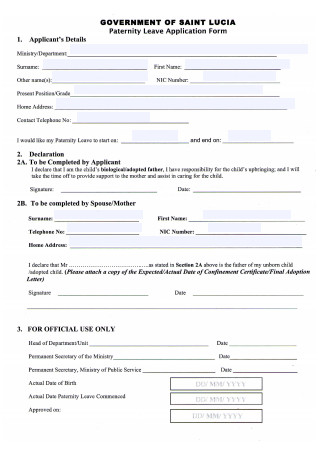
Paternity Leave Application Form Sample
download now -
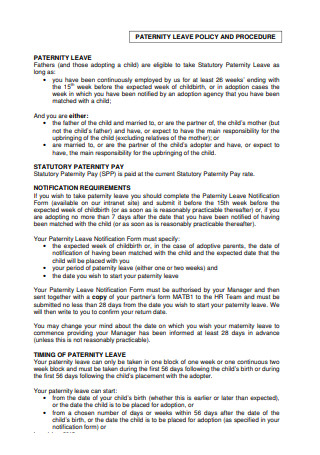
Paternity Leave Policy and Procedure
download now -
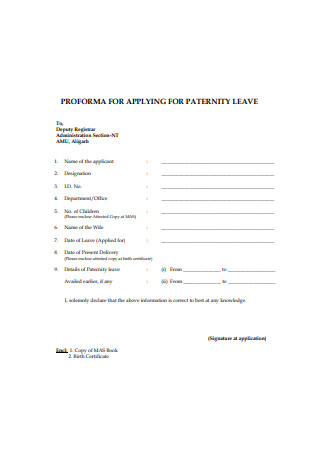
Basic Paternity Leave Format
download now -

Application for Paternity Leave Format
download now -
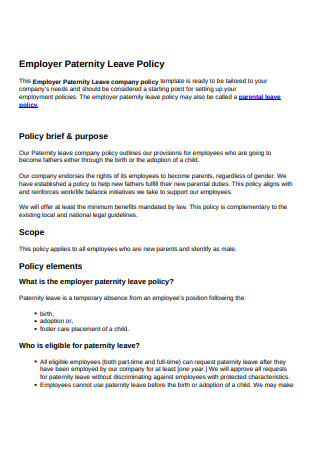
Employer Paternity Leave Policy
download now -
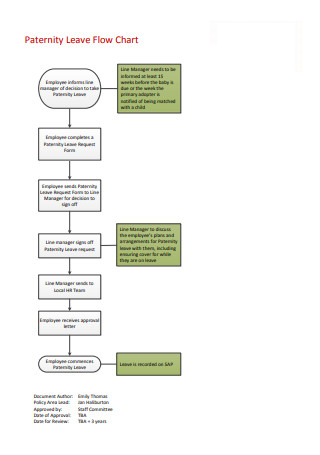
Paternity Leave Flow Chart
download now -

Paternity Leave Example
download now -
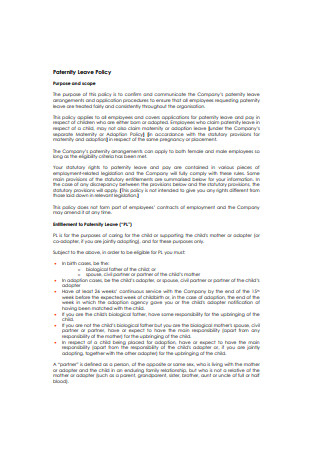
Sample Paternity Leave Policy Example
download now -
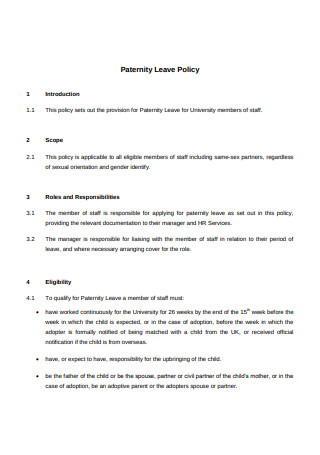
Basic Paternity Leave Policy Example
download now -
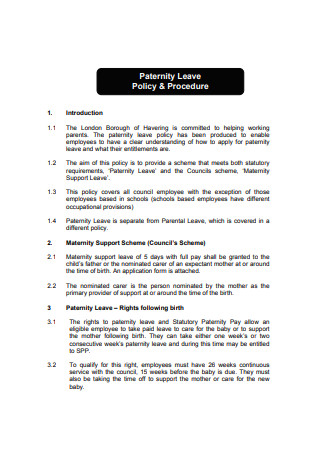
Sample Paternity Leave Policy and Procedure
download now -

Statutory Paternity leave
download now -
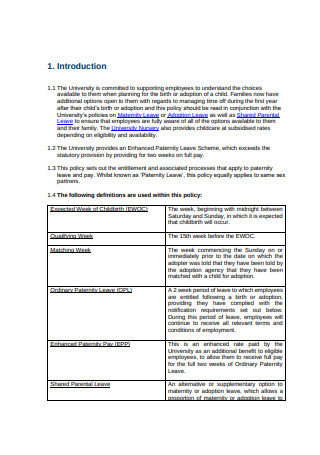
Printable Paternity Leave Policy
download now -
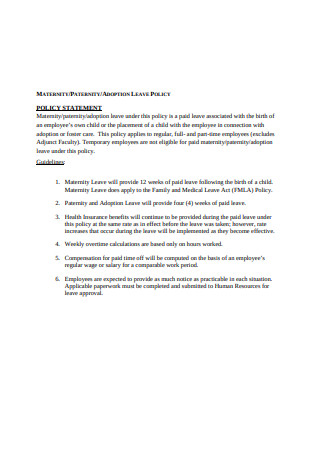
Paternity Leave Policy Format
download now -
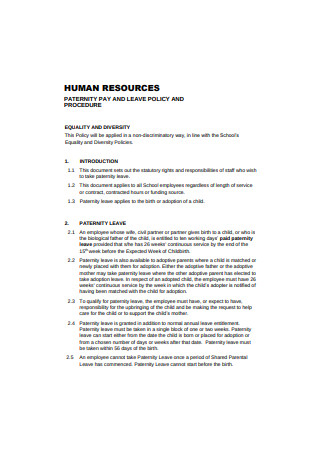
Basic Paternity Leave Policy and Procedure
download now -
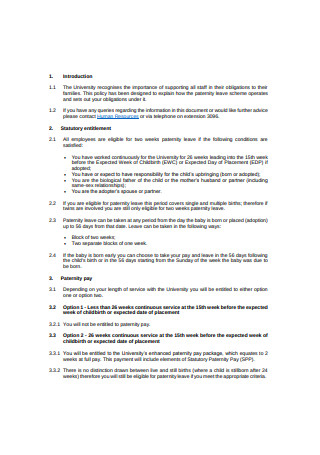
Sample Paternity Leave Policy Format
download now -

Paid Paternity Leave
download now -
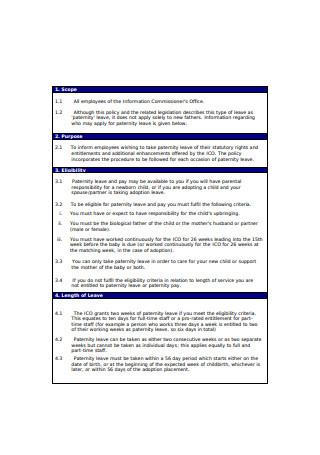
Paternity Leave Policy and Procedure Example
download now -
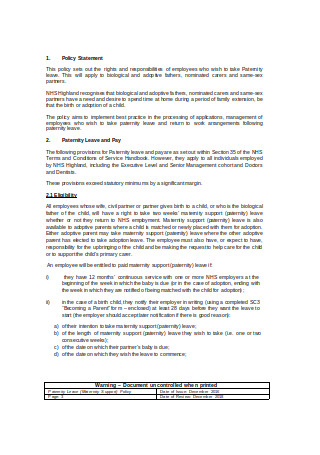
Paternity Leave Policy Sample
download now -
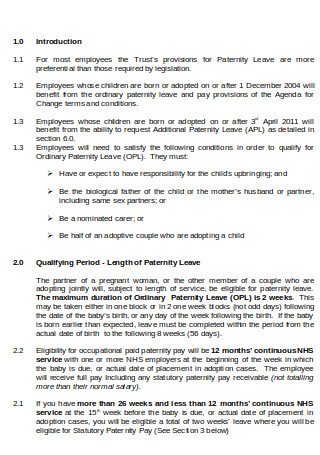
Basic Paternity Leave Policy Format
download now -

Paternity Leave Declaration Form
download now -
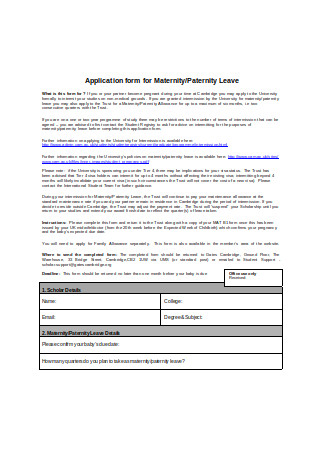
Paternity Leave Application Form Example
download now -
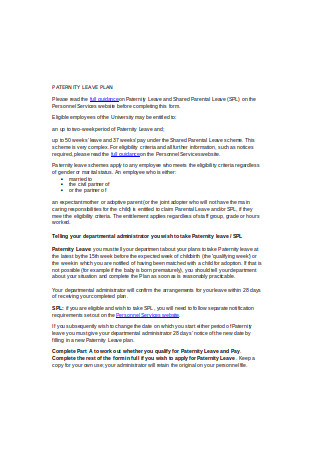
Paternity Leave Plan
download now -

Sample Paternity Leave Application Form
download now -
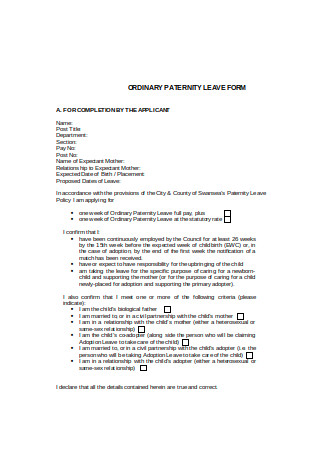
Basic Paternity Leave Form
download now -

Meternity and Perental Leave Template
download now
What Is Paternity Leave?
If you’re about to become a dad, you may want to take some time away from work to bond with your child. It can start as soon as the baby arrives to give you the chance to be there during the early chapters of their childhood. Nearly every employer provides paternity leaves for their male employees, but rarely are workers compensated during their leave of absence. If your workplace does offer paid leaves, you still have to meet the criteria to receive parental benefits. Some companies tend to combine paternity leaves with other forms of paid leaves, such as vacation leaves and sick leaves, which can be both a good thing and a bad thing for some.
For expectant fathers, it’s always best to check with your HR manager regarding paternity leave policies in your company and state.
Who Can File for Paternity Leave?
Only those who qualify for parental leave can enjoy the privileges that come with it. As an expectant father, it’s essential to be aware of these qualifications to find out what counts for your case.
Note that policies typically vary depending on the company or state you are in. For instance, you need to be part of a public or private organization that employs more than fifty people. Most state regulations also require you to be a member of the said institution for over a year. Other requirements center on your status as the father of the child and the partner of the child’s mother. Adoptive parents may also file for paternity leave, as long as they have the right documentation to support their case. As for those who have surrogates carrying their baby, the same circumstance applies.
The number of paid leaves you get can be anywhere between one and two weeks off, depending on the laws of your state and the policies indicated in your employee handbook. Expectant fathers can also choose to settle with unpaid leaves if they wish to extend their time off from work.
The Impact of Paid Paternity Leaves
The United States, which is a highly developed and industrious country, falls far behind other parts of the world in terms of offering paid paternity leave as an act of support for new fathers. According to the Society for Human Resource Management, access to paid paternity leave is pretty uncommon in the United States, with only about 9% of employers that grant it. But what many fail to realize is the lasting benefits that paid paternity leaves have for male employees, their families, and their employers.
On Fathers
No one ever wants to pass the opportunity to be there for their family at important life events. And while many dads recognize the value of family time, company policies often force men to cut their leaves short or to not get them at all in fear of losing their jobs. It’s a common problem faced by hardworking families across the U.S. that, fortunately, many employers are beginning to acknowledge. Paid paternity leaves create a sense of work-life balance for individuals struggling to make ends meet in a dog-eat-dog world.
On Families
In a recent publication authored by Richard Petts, Chris Knoester, and Jane Waldfogel on Springer, researchers discovered the impact of paternity leave-taking on father-child relationships. The study shows how fathers who take at least two weeks off from work are more likely to develop a positive perception in the eyes of their children. However, the lack of focus on paternal leave benefits in the country’s national paid parental leave policy only makes it difficult for fathers to remain active in the early stages of a child’s life.
Men who take paternity leaves have a better shot at strengthening their relationships with their families than those who don’t. That’s because they have more quality time to spend with their partner and newborn, as they slowly adjust to parenthood and all the drastic life changes that come with it. Paternity leaves also reduce the risk of divorce among many couples. The more support they offer their partners, the closer they grow as a family to overcome obstacles that come their way.
On Employers
The truth is, many first-time parents want to spend as much time as they can with their newborns. Children grow up faster than you think, and in a blink of an eye, you’re already celebrating their first birthday. Naturally, fathers would want to be a part of these milestones before they miss the chance to watch their children grow up all because they spent most of their days at the office. It’s one reason why parents would rather go for jobs that offer them that opportunity compared to those that demand much of their time and attention. It’s only reasonable for people to seek employers who are supportive of their lives beyond the four walls of the office, especially on matters that concern their families. Safe to say paternity leaves help boost employee engagement and retention in the workplace.
How Do You Plan Your Paternity Leave?
As you enter the world of parenthood, no amount of parenting books and seminars could ever prepare you for what’s to come. You might be feeling anxious and excited to finally meet your little bundle of joy, but there’s still a lot to get done to make sure you begin a new chapter of your life on the right foot. After all, in addition to becoming a dad, you still have your responsibilities as a partner to your spouse and an employee to a company.
Listed below are a few points to remember when preparing for your paternity leave.
1. Know Your Rights
Paternity leaves differ from maternity leaves in several aspects and may vary from state to state.
America’s Family and Medical Leave Act (FMLA) permits eligible employees a maximum of twelve weeks of leave to care for a newborn or an adopted child. Although many states mandate laws that grant paid leaves for new mothers, fathers don’t always get to enjoy the same benefits. For that reason, most men choose not to take advantage of the time off, as the lack of pay is not something that most individuals can afford to sustain the needs of their families.
The good news is more and more companies and lawmakers are beginning to improve their policies to adhere to the desires of their male employees. California, for instance, now has laws that offer paid leaves to all members of their workforce. It might take a couple more years before paternity leaves become accessible to men across the country. Still, the progress in the past decade does show a promising future for expectant fathers.
But your parental rights don’t only fall under a legal context. Society’s discriminative views on men being the breadwinner of the family often hinder employees from taking the time away from work. Some individuals even have a fear of jeopardizing their jobs due to the disapproving stares and whispers they could potentially receive from co-workers. It’s best to speak with someone from your company’s HR department to find out what options you have available.
2. Start Early
It’s never a good idea to wait until the last minute to start planning. There are a ton of matters that demand your attention before the baby comes, including work assignments, hospital preparations, and parental responsibilities. Most couples establish a co-parenting scheme by working around a rotation schedule to ensure the appropriate designation of tasks. If your partner is busy breastfeeding the baby, you can do the chores to keep the house clean and organized. Consider this as an opportunity for you to weigh down your options for what happens before, during, and after you go on paternity leave.
3. Prepare a Savings Fund
Having or adopting a child does not come cheap. No responsible parent would ever want to let their child suffer because of their poor decisions. Amidst the packs of diapers and milk cans that you have to sort through, you also need to worry about medical bills and other payments that come with parenthood. Planning helps you decide the number of unpaid leaves you can take based on what’s practical with your current budget. If the company you work for provides insurance along with unpaid leaves, you might want to talk things out with your supervisor or HR manager for clarification. Company loans might also be available for financial assistance.
4. Inform Your Boss ASAP
It’s important to tell your boss about your paternity plans weeks or months ahead of your leave to keep them on the loop. Your boss could even be one of the first people you share the good news to, as they’ll probably want to know why you’ve been taking a lot of time off work to accompany your wife to the hospital for regular visits. You can send in a personal letter or email to let your boss know about your leave early on. Some bosses can be very supportive, even offering you fatherly advice to help ease your mind from worry.
However, don’t expect your supervisors and managers to treat you any differently. You still have your responsibilities to uphold, and the last thing they’ll ever want to deal with is an employee who possesses a sense of entitlement. Thus, be careful not to cross any boundaries that already exist between you and your employer.
5. Finish as Much Work as Possible
The worse you can do is leave your desk with piles of unread papers and unfinished projects for the next person to handle. It’s never easy to continue a job that you didn’t start, so unless you’re available for a Skype call at eight in the morning after falling asleep at six, do your best to clear your workload before going on leave. It’s almost the same as sending a resignation letter and giving your employer two weeks’ notice to look for a replacement. Be considerate enough to make the job easier for the person who’ll act as a temporary substitute for when you’re gone. The least you can do is refuse long, complex assignments that you know you won’t be able to complete on time and offer to check in occasionally to answer questions and concerns.
If you’re thinking about going on paternity leave when your child comes, remember to discuss your plans with your employer before you start making any significant decisions. At the end of the day, you have the right to paternity leave under state and federal laws, so if you do get denied for all the wrong reasons, don’t think twice about reporting it to the proper authorities. And while we still have a long way to go to break the stigma, you must always be mindful of your priorities as a partner and a soon-to-be father.
